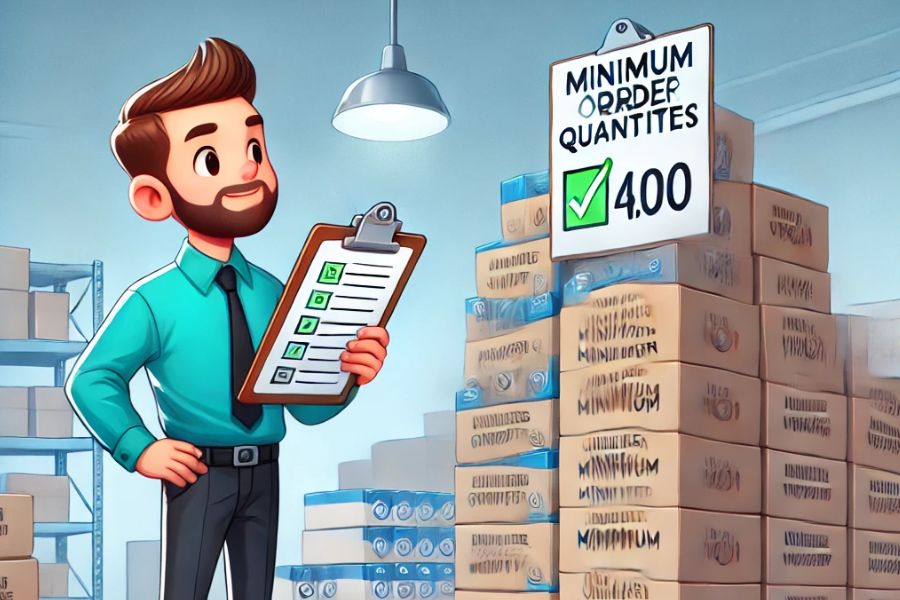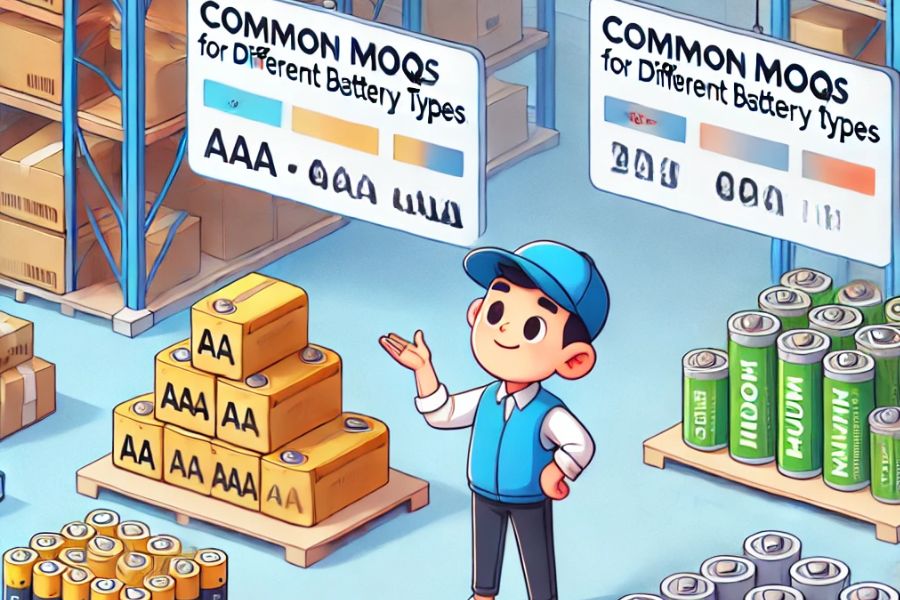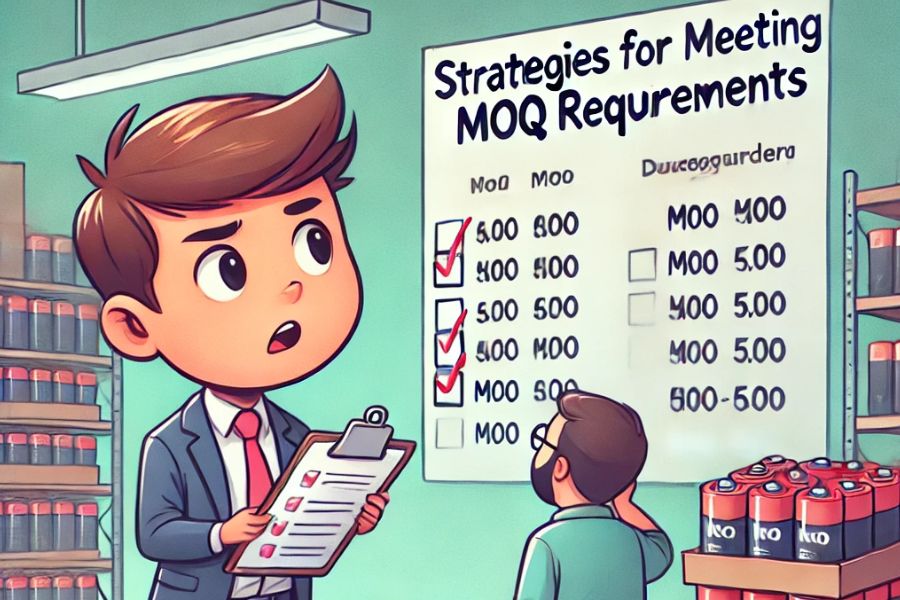Understanding Battery MOQ (Minimum Order Quantity)
In the world of battery purchases, the Minimum Order Quantity (MOQ) is the smallest batch a manufacturer or supplier can sell to us to avoid losses. As your trusted guide, we believe grasping this concept is essential to making smart buying decisions, planning budgets, streamlining procurement, and fostering successful negotiations.
MOQs influence unit prices, with larger orders often yielding lower cost per unit. But remember, achieving the ideal balance between cost, quantity, and safety is vital. There’s a lot to unpack here, and we promise, it gets really interesting as you explore further!
What is Battery MOQ?
Over time, you may have come across the term “Battery MOQ” and wondered what it means. As your trusted experts, we’re here to clear the confusion. Battery MOQ, or Battery Minimum Order Quantity, is a vital term in the battery industry.
When we talk about “Battery MOQ explained”, we’re referring to the smallest quantity of a specific type of battery that a manufacturer or supplier is willing to sell. These battery MOQ requirements create a safety net for suppliers, ensuring they do not sell at a loss.
But why should you, as a customer, care about the minimum order quantity for batteries? Well, understanding MOQ can help you make more informed decisions and avoid any unpleasant surprises when placing your orders.
We know safety is a priority for you. Rest assured, MOQs are set while keeping your safety in mind. Larger battery orders tend to have stringent quality checks, ensuring you receive safe, reliable products.
Why Minimum Order Quantities Matter in Bulk Orders

Diving right into the heart of the matter, minimum order quantities play a significant role, especially in bulk orders. If you’re planning to order batteries in large quantities, understanding the MOQ for bulk batteries is essential. It’s not just about the numbers; it’s about ensuring that your order aligns with your needs, budget, and expectations.
The benefits of minimum order quantities are twofold. First, they guarantee a level of safety. By adhering to MOQs, you’re ensuring you’re investing in quality-controlled, tested batteries that meet industry standards. You’re not just buying batteries; you’re buying safety and peace of mind.
Second, MOQs for bulk batteries can help streamline your procurement process. Knowing the limit can help you plan better, negotiate effectively, and avoid the pitfalls of overstocking or understocking.
But what if the set MOQ seems too high? That’s where negotiating battery MOQs comes into play. By discussing your specific needs with the supplier, you can work towards a mutually beneficial agreement. Remember, MOQs aren’t set in stone; they’re a starting point for negotiations. Understand them, negotiate them, and use them to your advantage.
How MOQ Affects Bulk Battery Pricing
Maneuvering the landscape of bulk battery pricing, the influence of MOQ can’t be overlooked. As a significant factor, MOQ for wholesale batteries directly impacts the cost per unit. How so, you ask? Well, suppliers often offer reduced prices per battery for larger orders. They’re encouraging us to buy more, and who doesn’t appreciate a good bargain?
But here’s the catch. While it’s tempting to jump at the chance of low unit prices, we need to take into account the overall investment. If you’re looking at small MOQ for battery orders, the price per unit might be higher, but the total cost could be less intimidating. It’s a balancing act, and getting it right is essential to effective cost management.
Now, we hear you. Safety is your top priority. Low MOQ battery suppliers cater to this need, offering smaller quantities without compromising safety standards. This way, you can keep your initial investment low, test the waters safely, and gradually increase your order size. It’s about finding the right balance between cost, quantity, and safety. That’s how MOQ influences bulk battery pricing.
Negotiating MOQ with Battery Suppliers
After understanding how MOQ influences bulk battery pricing, the next step is to master the art of negotiation with battery suppliers. This process isn’t as challenging as it may seem, and we’re here to guide you through it.
Firstly, know your needs. Quantify your business’s battery requirements. A clear understanding of your needs will put you in a stronger position when negotiating. Don’t be afraid to discuss the possibility of smaller MOQs, especially if it’s your first order.
Open, honest communication is essential. Express your concerns about safety, and ask how the supplier guarantees product quality. Your safety-first approach will resonate with reputable suppliers.
While negotiating, remember suppliers are businesses too. They also have costs to cover. Offer them assurance of future orders if the product meets your standards. This way, they might be willing to evaluate lower MOQs.
We suggest you don’t limit yourself to one supplier. Explore multiple suppliers with flexible MOQs. This gives you room to negotiate and find a deal that suits both parties.
Choosing Suppliers with Flexible MOQ Options
Finding the right supplier, particularly those with flexible MOQ options, is a crucial part of procuring batteries in bulk. Suppliers who offer flexibility in their MOQs can markedly reduce the initial investment, allowing you to manage your inventory more efficiently.
When choosing such suppliers, consider the following:
- Supplier Reputation: Look for suppliers who’ve established a solid reputation in the industry. They’re likely to offer more flexibility.
- Quality Assurance: Verify that the supplier maintains high standards, even with lower MOQs.
- Delivery Time: Suppliers should be able to meet your timing needs, irrespective of the order size.
- Price: Even with flexible MOQs, suppliers should offer competitive pricing.
- Customer Service: Opt for suppliers who provide excellent customer support and are responsive to queries.
We can’t overstate the significance of safety when dealing with batteries. Suppliers with flexible MOQs shouldn’t compromise on safety standards. It’s your responsibility to verify that the supplier you choose prioritizes safety above all else. Remember, a flexible MOQ is beneficial only when it doesn’t compromise on the quality and safety of the batteries.
Common MOQs for Different Battery Types

Having considered suppliers with flexible MOQs, let’s now turn our attention to the common MOQs for various types of batteries. Lead-acid batteries, frequently used in vehicles, typically have an MOQ of 500 units. This is due to their larger size and manufacturing complexities.
On the other hand, smaller batteries such as lithium-ion, commonly found in portable devices like phones and laptops, often start with MOQs of 1000 units. This is not only because of their smaller size, but also due to the higher demand for these batteries.
For specialized batteries, such as those used in medical equipment or high-end electronics, the MOQ can be as low as 50 units. This is due to their niche market, and the high cost per unit.
Understanding these common MOQs allows us to plan our purchases better. It guarantees we’re not caught off-guard by unexpected bulk orders, but instead, we can strategically manage our inventory and budget. Remember, safety’s our priority, so it’s vital to choose a reputable supplier who adheres to safety regulations, irrespective of their MOQ. Next, we’ll talk about the pros and cons of high MOQ for battery orders.
Pros and Cons of High MOQ for Battery Orders
In our quest for efficient inventory management, we must weigh the upsides and downsides of high MOQ for battery orders. While a higher MOQ can potentially lead to better unit prices, it also poses several challenges.
Here’s a breakdown of the pros and cons:
- Pro: Lower Unit Costs: Buying in bulk can lower unit costs substantially. It’s the classic “buy more, save more” philosophy.
- Con: Storage Issues: Ordering in large volumes can result in storage issues, particularly for large or specialty batteries.
- Pro: Guarantees Supply: With high MOQs, you’re less likely to run out of stock, guaranteeing a constant supply for your customers.
- Con: Tied Up Capital: Bulk purchases mean a significant amount of your capital is tied up in inventory, potentially limiting cash flow.
- Con: Safety Risks: Larger quantities increase the risk of safety incidents, such as leaks or fires, especially with lithium batteries.
We’d advise carefully considering these factors before placing a high MOQ battery order. Remember, the goal is to strike a balance between cost-efficiency and safety.
Finding Suppliers with Low MOQ Requirements
Maneuvering the landscape of battery suppliers can feel like a minefield, but we’re here to guide you towards those with low MOQ requirements. It’s not just about finding a supplier. It’s about finding the right supplier that meets your specific needs, without compromising on safety or quality.
The first step is research. Look for suppliers who specialize in low MOQs. These companies have designed their business model to cater to clients like you. Next, vet your potential suppliers. Don’t just take their word for it – verify their claims. Check their certifications, customer reviews, and product quality.
A low MOQ doesn’t mean much if the product is subpar. Confirm that the supplier is not cutting corners to offer low MOQs. Finally, negotiate. Many suppliers are willing to lower their MOQ if you can commit to a long-term relationship or place larger orders in the future.
Understanding MOQ for Small and Large Businesses
Steering through the world of MOQs, it’s our challenge to grasp their impact on both small and large businesses. For small businesses, high MOQs can be intimidating. They often operate on tighter budgets and may not have the storage for large quantities of stock. High MOQs can result in increased financial risk and excess inventory.
On the flip side, large businesses generally have more financial flexibility and storage capacity. They can handle higher MOQs and can take advantage of the lower per-unit costs that often accompany larger orders. However, they too must be cautious of overstocking and capital immobilization.
To navigate these considerations, keep these points in mind:
- Assess your financial capacity and storage space.
- Understand the risk of overstocking.
- Calculate the per-unit cost difference between low and high MOQs.
- Consider your sales forecast and inventory turnover rate.
- Remember, safety in business also means financial prudence.
In all, understanding MOQs is essential for managing inventory, controlling costs, and maintaining business safety. Whether you’re a small or large business, the right balance must be struck.
Strategies for Meeting MOQ Requirements

Meeting MOQ requirements might seem intimidating, but we’ve got several strategies that can help. First, we suggest negotiating with your supplier. Sometimes, they may be willing to lower their MOQ requirements if you can guarantee a long-term business relationship. It’s a win-win situation: you meet your immediate needs without overstocking, and they secure a loyal customer.
Next, consider joining forces with other small businesses to place a collective order. This way, you can share the cost and quantity, making it easier to meet the MOQ. Be sure to choose businesses you trust, as this approach requires a high level of cooperation and coordination.
Lastly, look for suppliers who offer graduated MOQs. These suppliers provide flexibility by allowing smaller orders initially, but expect larger orders down the line as your business grows. This is an excellent strategy for startups or businesses with growth potential.
Always remember, safety is paramount. Regardless of the strategy you choose, verify the supplier maintains high safety standards for their batteries. This way, you’re not only meeting MOQs efficiently but also prioritizing the safety of your customers and your business.
MOQ and Inventory Management for Bulk Batteries
While we’ve discussed strategies to meet MOQs, it’s equally essential to contemplate how these requirements affect your inventory management, particularly when dealing with bulk batteries. Proper inventory management can help guarantee safety and efficiency while also reducing costs.
Consider these critical points for managing bulk batteries inventory:
- *Maintain Safety Standards*: Always adhere to safety regulations. Improper storage can lead to accidents, affecting both people and property.
- *Adequate Storage Space*: Depending on the MOQ, large quantities may require substantial storage space. Confirm you have enough room to safely store your batteries.
- *Inventory Turnover*: Aim for a high inventory turnover rate. This implies that your batteries are selling swiftly, reducing the risk of them becoming obsolete or reaching their expiry dates.
- *Manage Lead Times*: Understand your supplier’s lead times. This helps in planning your orders and maintaining a steady supply without overstocking.
- *Monitor Inventory Levels*: Regularly check your inventory levels. This helps avoid situations where you run out of stock or have excess inventory.
Future Trends in MOQ for Battery Suppliers
Frequently, we see trends in the battery supply industry fluctuate as technology evolves and customer demands shift. The future of MOQ for battery suppliers is no different. We’re anticipating a shift towards lower MOQs, driven by the increasing need for custom solutions and smaller, more specialized orders.
As technology advances, customers are demanding more specific products tailored to their unique needs. This demand for customization is causing suppliers to reconsider their MOQs. Lower MOQs mean we can accommodate these customers, fostering stronger relationships and driving business growth.
Moreover, as sustainability becomes a bigger concern, we predict a rise in the demand for recyclable batteries. Suppliers who can offer lower MOQs for sustainable products will have a competitive edge.
But don’t worry, lower MOQs won’t compromise safety. Suppliers will still adhere to the highest safety standards, ensuring every battery delivered is safe and reliable.
We’re excited about these future trends in MOQ for battery suppliers. They’ll allow us to better serve our customers, while maintaining the safety and quality you’ve come to expect. Stay tuned for more updates as we navigate this ever-evolving industry.
Conclusion
Understanding the MOQ for batteries is essential for both small and large businesses. It affects pricing, inventory management, and supplier relationships. That’s why we recommend negotiating with suppliers, choosing those with flexible MOQ options, and adopting smart strategies to meet MOQ requirements.
As we look to the future, we hope for more flexible MOQ trends in the battery industry, benefitting all businesses. Stay informed and make strategic decisions for your business’s battery needs.

